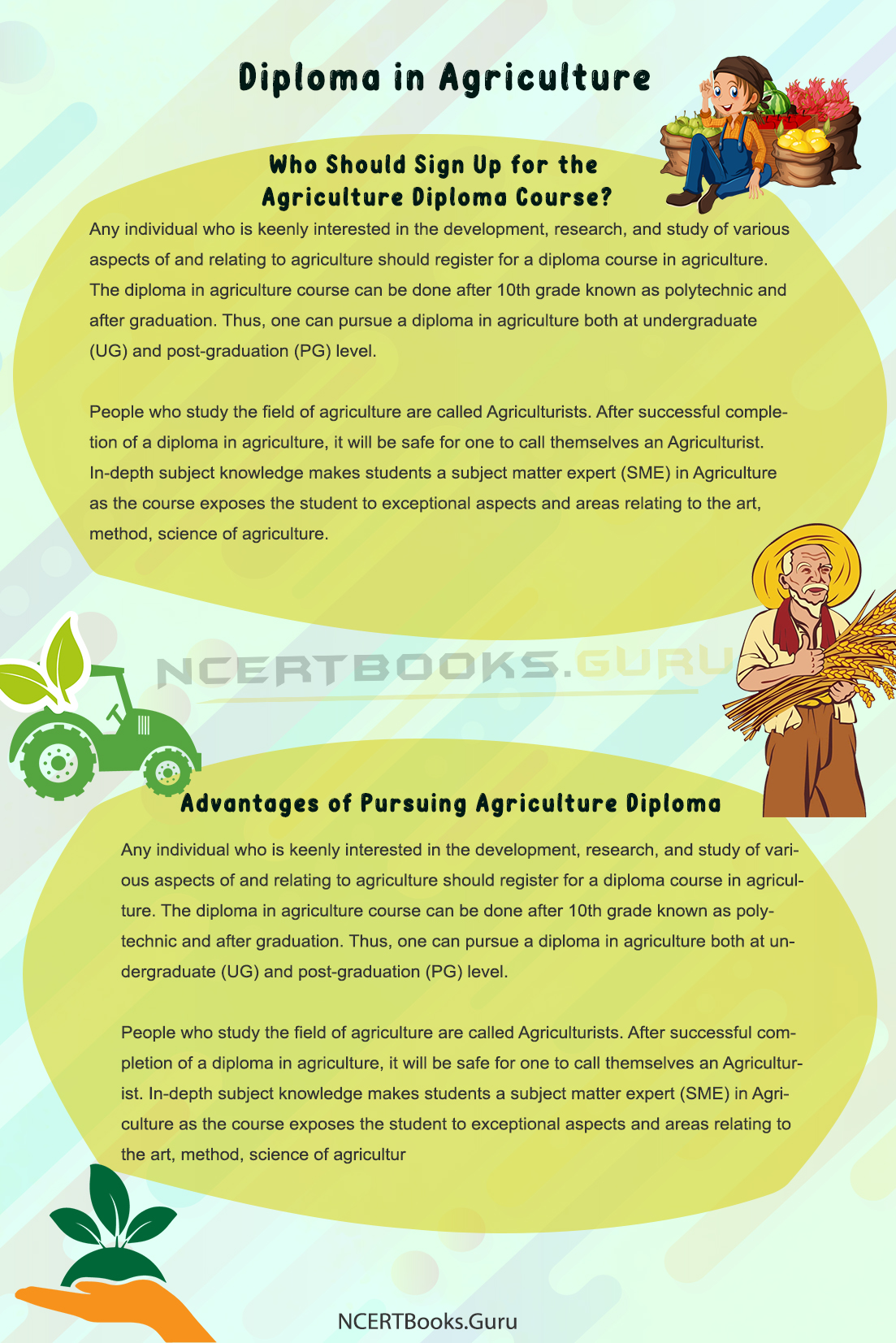Diploma in Agriculture: Since as long as we can remember, our country India is known as an Agrarian country which means that the primary occupation of most people in the country is agriculture; therefore, the scope of business as well as career opportunities in this sector are extensive and on a large scale.
It is essential to understand that agriculture is a wide-spanning term that contains so many areas under it. Few of these include farming, fishing, zoology, economics, and engineering of agriculture, forestry, food production, poultry and livestock, botany, horticulture, animal science, environmental preservation, and so on. It points out that agriculture is much more than farming, and crop cultivation is just one small aspect of it.
Get to Know More about other types of Course Details in Stream wise, and Category wise
Diploma in Agriculture
Given the vast scope of the sector and ample opportunities that span across various areas or branches under agriculture, it makes complete sense to educate people who are interested in knowing it formally. Diploma in Agriculture is a short course bearing the duration between one to two years. It focuses on imparting knowledge (both practical as well as theoretical) within individuals who register for the course. In India, there are ample universities, colleges as well as institutions that offer diploma in agriculture.
Who Should Sign Up for the Agriculture Diploma Course?
Any individual who is keenly interested in the development, research, and study of various aspects of and relating to agriculture should register for a diploma course in agriculture. The diploma in agriculture course can be done after 10th grade known as polytechnic and after graduation. Thus, one can pursue a diploma in agriculture both at undergraduate (UG) and post-graduation (PG) level.
People who study the field of agriculture are called Agriculturists. After successful completion of a diploma in agriculture, it will be safe for one to call themselves an Agriculturist. In-depth subject knowledge makes students a subject matter expert (SME) in Agriculture as the course exposes the student to exceptional aspects and areas relating to the art, method, science of agriculture.
About the Diploma in Agriculture Course
When one signs up for a course such as a diploma in agriculture, they are not only exposed to such diverse areas as discussed, but they also study about them. Some subjects form a core of the curriculum and are thus in detail, whereas only an overview of some agricultural areas forms a part of the course. Students can specialize in the subjects they wish to study further or are keenly interested in really.
The course gives students a chance to explore the art and subject of agriculture as a whole while helping them strengthen their knowledge and skill in this crucial area. Depending on the subjects a candidate chooses and the university or institution they do their diploma from, the mix of practical and theory exams and evaluations will differ. The course, however, offers students an eclectic mix of both theoretical and practical application of all that one must know as an Agriculturist.
Advantages of Pursuing Agriculture Diploma
The benefits of an Agriculture Diploma are that it can be done directly after 10th grade. This diploma is a short term course whose duration ranges from anything between one year to two years. The job opportunities after completion of Agriculture diploma are plenty in the areas of food production, horticulture, government jobs in the agriculture department, Agri sales officers, fertilizer plants, plantation, etc. One can also further in the field of research post the diploma.
Another point to note is that after a student completes an agriculture diploma, she/he can directly get admission into the second year of B.Sc Agriculture, they do not have to go through the first year again. This way, a student saves one year in academics. The biggest specialty of the diploma is also how practicality supersedes the theoretical concepts while learning. With nominal fees and a detailed curriculum, this course is a perfect fit for any aspirant who is keen to study agriculture. You can also pursue this program in correspondence from the comfort of your home.

Diploma in Agriculture Eligibility
The eligibility criteria depend on the course one opts for as the diploma can be done at both graduate and post-graduate levels. However, one must have a certified mark-sheet which proves that they have successfully cleared and passed their grade ten or standard 10th exams.
There are also particular entrance exams that one must enroll for if they want to get admitted into a specific educational institution. Accordingly, the cutoff and merit list based calls will be rolled out to candidates who qualify.
Topics and Subjects Covered in Diploma in Agriculture
Agriculture is such a discipline that is both broad and deep, even when so much of it remains undiscovered. Therefore, a wide array of subjects comprise the course curriculum. To name a few, Agriculture Engineering, sericulture, horticulture, pisciculture, agronomy, agriculture economics, applied mathematics, irrigation and drainage (in detail), dairy engineering.
Even principles of environmental science, food processing, a theory of machines, food packaging and plant design and layout, hydro management, farm and watershed resource management, crop production technology, breeding, systems engineering, tractor testing and designing, mechanics of engineering, organic farming, harvest technology, etc.
One can specialize in a particular branch that they want to choose. Certain major areas under agriculture are soil science, nematology, forestry, poultry farming, seed technology, plant pathology, etc.
Fee Structure of Diploma in Agriculture
The average fees of the course could be considered as rupees fifty thousand (50,000) as the fees differ with universities and courses and cost anywhere between a minimum of rupees fifteen thousand to a higher end of rupees one lakh. Few universities also give a waiver to selected students, and even scholarships are provided.
Career Opportunities After Diploma In Agriculture
One can further into areas of forestry, agronomy, farm engineering and technology, food processing, food technology, packaging, soil and seed engineering, resource management, soil engineer, food production, crop production, trader/supplier (wholesale/retail), hydro project management, greenfield or brownfield projects in agricultural avenues.
Hence, a diploma in agriculture is not only an offbeat choice as a study stream but also a promising career prospect. So many commercial biggies are constantly looking out to hire people who are technically and practically strong in their knowledge about agriculture.
FAQ’s on Diploma In Agriculture
Question 1.
What is the benefit of a Diploma in Agriculture?
Answer:
The job opportunities after completion of Agriculture diploma are plenty in the areas of food production, horticulture, government jobs in the agriculture department, Agri sales officers, fertilizer plants, plantation, etc. Moreover, the duration of the diploma is between a year to two only.
Question 2.
How much does a Diploma in Agriculture cost in India?
Answer:
On average, the fees for a Diploma in Agriculture could cost around rupees fifty thousand (50,000). Moreover, depending upon the universities and courses and cost may differ anywhere between a minimum of rupees fifteen thousand to a higher end of rupees one lakh.
